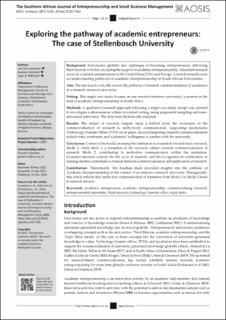| dc.contributor.author | Louwrens, Lee-Ann | |
| dc.contributor.author | Solomon, Goosain | |
| dc.contributor.author | Pettersen, Inger Beate | |
| dc.date.accessioned | 2024-04-15T07:59:24Z | |
| dc.date.available | 2024-04-15T07:59:24Z | |
| dc.date.created | 2023-12-19T09:19:23Z | |
| dc.date.issued | 2023 | |
| dc.identifier.citation | The Southern African Journal of Entrepreneurship and Small Business Management. 2023, 15 (1), . | en_US |
| dc.identifier.issn | 2522-7343 | |
| dc.identifier.uri | https://hdl.handle.net/11250/3126436 | |
| dc.description.abstract | Background: Universities globally face challenges of becoming entrepreneurial, delivering third mission activities, including the support of academic entrepreneurship. Abundant research exists on academic entrepreneurs in the United Sates (USA) and Europe. Limited research exists on understanding pathways of academic entrepreneurship in South African Universities.
Aim: The aim was to critically review the pathway of research commercialisation of academics at a research-intensive university.
Setting: This single case study focuses on one research-intensive university; a pioneer in the field of academic entrepreneurship in South Africa.
Methods: A qualitative research approach following a single-case study design was selected to investigate a phenomenon within its natural setting, using purposeful sampling and semi-structured interviews. The data were thematically analysed.
Results: The nature of research outputs takes a hybrid form, the awareness of the commercialisation of research is ineffectively communicated, supporting mechanisms Technology Transfer Office (TTO) are in place, factors hampering research commercialisation include time constraints and academics’ willingness to partner with the university.
Conclusion: Context is bi-modal, meaning the institution is orientated towards basic research, Mode 1, while there is a transition of the research culture towards commercialisation of research, Mode 2, contributing to ineffective communication within the institution. Commercialisation extends the life cycle of research, and the recognition for publication in ranking metrics contributes to tension between commercialisation and publication of research.
Contribution: Theoretically, this baseline study provided insights into the pathway of Academic Entrepreneurship in the context of an intensive-research university. Managerially, this article reflects that ineffective communication of transition from Mode 1 to Mode 2 leads to internal tension. | en_US |
| dc.language.iso | eng | en_US |
| dc.publisher | AOSIS Publishing | en_US |
| dc.rights | Navngivelse 4.0 Internasjonal | * |
| dc.rights.uri | http://creativecommons.org/licenses/by/4.0/deed.no | * |
| dc.title | Exploring the pathway of academic entrepreneurs: The case of Stellenbosch University | en_US |
| dc.type | Peer reviewed | en_US |
| dc.type | Journal article | en_US |
| dc.description.version | publishedVersion | en_US |
| dc.rights.holder | © 2023. The Authors | en_US |
| dc.source.pagenumber | 0 | en_US |
| dc.source.volume | 15 | en_US |
| dc.source.journal | The Southern African Journal of Entrepreneurship and Small Business Management | en_US |
| dc.source.issue | 1 | en_US |
| dc.identifier.doi | 10.4102/SAJESBM.V15I1.680 | |
| dc.identifier.cristin | 2215294 | |
| dc.source.articlenumber | a680 | en_US |
| cristin.ispublished | true | |
| cristin.fulltext | original | |
| cristin.qualitycode | 1 | |

